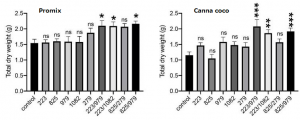A group from University of Moncton, Moncton, NB, Canada, etc. has reported that interactions between Bacillus Spp. and Pseudomonas Spp. promotes plant growth.
https://www.ncbi.nlm.nih.gov/pmc/articles/PMC8488376/
In this work, Pseudomonas spp. and Bacillus spp. isolates obtained from Canadian soils have been utilized to assess their ability to promote the growth of Cannabis sativa when inoculated alone or in combination treatments in different commercial soil substrates (Promix and Canna coco) commonly used to grow cannabis.
It was demonstrated that single treatments do not stimulate growth promotion under the conditions tested, but combinatorial treatments (Bacillus and Pseudomonas) have a significant positive effect on plant growth.
 Here, 223, 825 = Pseudomonas, 979, 1082, 279 = Bacillus. Promix and Canna coco are different types of commercial soil substrates.
Here, 223, 825 = Pseudomonas, 979, 1082, 279 = Bacillus. Promix and Canna coco are different types of commercial soil substrates.
Five metabolic pathways could be identified as differently abundant in Canna coco, all of which were also found in Promix:
- oxidative glucose degradation
- creatinine degradation I
- L-lysine biosynthesis II
- S-methyl-5-thio-α-D-ribose 1-phosphate degradation I
- L-methionine salvage cycle III)
These five pathways might be the background of plant growth enhancement, and could easily be linked back to either Pseudomonas spp. or Bacillus spp. metabolism.
Phospholipase metabolic pathway identified in the study is also an important secondary messenger pathway in plants, regulating response to phytohormones and pathogen elicitation. Secreted bacterial phospholipases have the capacity to liberate phosphorus from phospholipids, which the plant could assimilate, potentially augmenting plant growth. The phospholipase pathway together with sugar metabolism in Pseudomonas spp. might significantly increase the availability of essential soil nutrients for the plant and promote plant growth.
